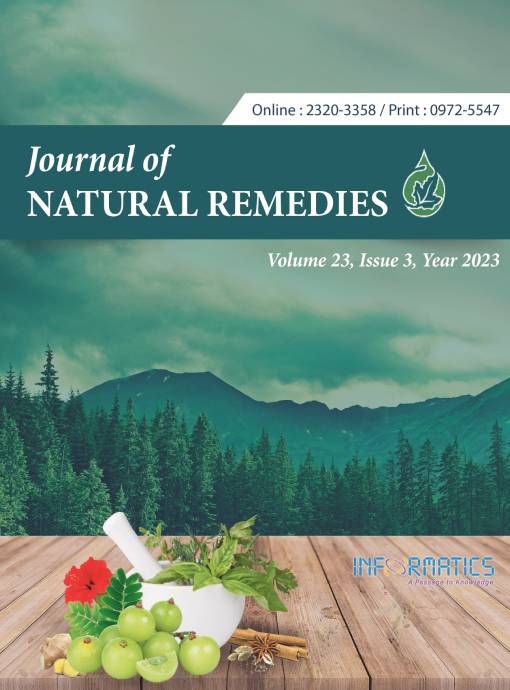Holistic Approach Toward Senile Dementia with Ayurveda – A Case Report
DOI:
https://doi.org/10.18311/jnr/2023/29929Keywords:
Holistic Approach, Mild Cognitive Impairment, Mini Mental Scale Examination, Shatavari GhanavatiAbstract
Neurological problems are a burning issue in today’s Era. The brain is that vital organ which makes humans unique from other living beings. It is the site of all the intellectual powers humans have. Memory is an important aspect of this intellectual property. It gives us protection from harmful things. Here is a case of mild cognitive impairment. The patient, 68 years old came with his son to OPD with loss of memory for 2 years. He used to forget his meals, and juices from taking on time. He used to forget the flame of burners. He used to repeat the same phrases after a fraction of the time. The patient had taken many medicines, but the condition got worse. He felt sleepy and drowsy all day. The patient was well-oriented to time and place. The Mini-mental scale examination score of this patient was 22. This patient was treated with a holistic approach. Holistic means to treat all aspects of the patient. The patient was advised to take internal medicine (Shatavari Ghanavati), meditation, counselling, and diet. The internal medication was given for three months. Counselling was done every fortnight. The patient was advised to do meditation on a daily basis. Some food regimes were advised to the patient. Then after the complete course of medicine. The Mini-mental scale examination was performed, and the score was 25 which was satisfactory for that patient. The herbal medicine along with other aspects of surviving healthy life helped this patient to live normally.
Downloads
Metrics
Downloads
Published
How to Cite
Issue
Section
License
Copyright (c) 2022 Mayuri Amol Deshpande, Amol Madhav Deshpande

This work is licensed under a Creative Commons Attribution 4.0 International License.
Accepted 2023-05-05
Published 2023-07-28
References
Chauhan A, Semwal DK, Mishra SP, Semwal RB. Ayurvedic research and methodology: Present status and future strategies. Ayu. 2015; 36(4):364. https:// doi.org/10.4103/0974-8520.190699 PMid:27833362 PMCid:PMC5041382. DOI: https://doi.org/10.4103/0974-8520.190699
Sleeper R. Common geriatric syndromes and special problems. The Consultant Pharmacist®. 2009; 24(6):447-62. https://doi.org/10.4140/TCP.n.2009.051 PMid:19555155. DOI: https://doi.org/10.4140/TCP.n.2009.051
Fiber E, Neurath O. Senility: Putting an end to the myth. In our aging parents. University of Hawaii Press. 2021; pp. 87-99. https://doi.org/10.1515/ 9780824887605-010 DOI: https://doi.org/10.1515/9780824887605-010
Vas CJ, Pinto C, Panikker D, Noronha S, Deshpande N, Kulkarni L, Sachdeva S. Prevalence of dementia in an urban Indian population. International psychogeriatrics. 2001; 13(4):439-50. https://doi. org/10.1017/S1041610201007852 PMid: 12003250. DOI: https://doi.org/10.1017/S1041610201007852
Ramu MG, Venkataram BS. Manovikara (mental disorders) in Ayurveda. Ancient science of life. 1985; 4(3):165.
Orgogozo JM, Spiegel R. Critical review of clinical trials in senile dementia--I. Postgraduate Medical Journal. 1987; 63(738):237. https://doi. org/10.1136/pgmj.63.738.237 PMid:2891126 PMCid: PMC2428174. DOI: https://doi.org/10.1136/pgmj.63.738.237
Deshpande MA, Kuchewar V. Comparative Evaluation of the Efficacy of Shatavari Ghanavati and Bramhi Ghanvati in Jarajanya smritibramsha (Senile Dementia). Journal of Pharmaceutical Research International. 2021; 33(61A):232-9. https://doi. org/10.9734/jpri/2021/v33i61A35462 DOI: https://doi.org/10.9734/jpri/2021/v33i61A35462
Kumar A, Rinwa P, Kaur G, Machawal L. Stress: Neurobiology, consequences and management. Journal of Pharmacy and Bioallied Sciences. 2013; 5(2):91. https://doi.org/10.4103/0975-7406.111818 PMid:23833514 PMCid:PMC3697199.
Acharya SG, Acharya MR. Role of Ayurveda medicine in the management of neurological disorders.
Milkhe VP, Shende VM, Kharat VR, Shekokar VS. Concept of Gurvadi Guna and application of Tikshna, Sthira, Sara, Mrudu, Kathina, Vishada, Picchil gunas in Ayurveda.
Kumar A, Rinwa P, Kaur G, Machawal L. Stress: Neurobiology, consequences and management. Journal of Pharmacy and Bioallied Sciences. 2013; 5(2):91. https://doi.org/10.4103/0975-7406.111818 PMid: 23833514 PMCid:PMC3697199. DOI: https://doi.org/10.4103/0975-7406.111818
Basso JC, McHale A, Ende V, Oberlin DJ, Suzuki WA. Brief, daily meditation enhances attention, memory, mood, and emotional regulation in non-experienced meditators. Behavioural brain research. 2019; 356:208-20. https://doi.org/10.1016/j.bbr.2018.08.023 PMid:30153464. DOI: https://doi.org/10.1016/j.bbr.2018.08.023
Murthy AR, Singh RH. The concept of psychotherapy in Ayurveda with special reference to Satvavajaya. Ancient Science of Life. 1987; 6(4):255.
Deshpande AM, Deshpande MA. Role of Rasayan churna in outbreak of COVID-19 as preventive and curative aspect. International Journal of Research in Pharmaceutical Sciences. 2020. p. 1208-12. https:// doi.org/10.26452/ijrps.v11iSPL1.3594 DOI: https://doi.org/10.26452/ijrps.v11iSPL1.3594

 Mayuri Deshpande
Mayuri Deshpande









 0.35
0.35 24
24 0.161
0.161